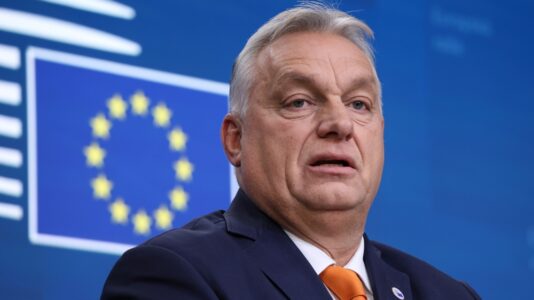The Ukrainian government is intensifying efforts to facilitate the return of war refugees currently residing in Germany with the establishment of “unity hubs” in Berlin.
Starting in the German capital and expected to be rolled out to other major cities, the centers aim to assist refugees with job placement, housing, and access to educational opportunities back in their home country to encourage repatriation.
“A significant number of Ukrainians are seriously considering returning home,” claimed Ukrainian Deputy Prime Minister Oleksiy Chernyshov in an interview with the German Press Agency (dpa). Chernyshov, who heads the Ministry of National Unity — a department created in December to manage refugee return efforts — visited Berlin last week to prepare for the launch of the hubs.
In a press release on Jan. 16, the German government said the unity hubs would “act as a point of contact for Ukrainian refugees in Germany, providing cultural opportunities, courses on the German language and culture, assistance with finding jobs in Ukraine and Germany as well as advice on returning to Ukraine voluntarily and helping to rebuild the country.”
“We are helping Ukraine maintain close contact with Ukrainian nationals who have fled to Germany because of this horrific war, and the first Unity Hub in Berlin will soon assist us in this effort,” added Federal Minister of the Interior Nancy Faeser.
According to the United Nations High Commissioner for Refugees (UNHCR), as of Jan. 11, 1.24 million Ukrainians have been registered in Germany since the Russian invasion in February 2022.
The Kyiv administration estimates that 32 million Ukrainian citizens remain in government-controlled territories with between 20-25 million now living abroad. Chernyshov emphasized that Ukraine urgently needed workers to return to assist in critical industries such as arms production, energy, and reconstruction.
Many working-age Ukrainian males fled the country to avoid conscription, but the government has now claimed it will offer military service deferrals for those employed in key sectors. “If you work at a power plant, you won’t be called up. You have a guarantee,” Chernyshov stated.
Despite these incentives, convincing refugees to return may prove difficult. A November 2024 survey at Berlin’s Tegel emergency shelter revealed that 65 percent of respondents wished to remain in Germany permanently. This marked a significant shift from earlier sentiments, where most expressed plans to return to Ukraine post-war.
Mark Seibert, president of Berlin’s State Office for Refugee Affairs (LAF), noted the changing attitudes: “We see that the picture is turning. Currently, a majority say: ‘We’re staying here. We’re getting settled.'”
Ukrainian refugees in Germany benefit from a unique legal status, granting them work authorization, access to healthcare, social benefits, and language courses. National trends echo Berlin’s findings, with consecutive polls showing an increasing desire to stay. A 2023 survey by the IAB research group found that 44 percent of Ukrainian refugees intended to remain in Germany, up from 37 percent the previous year.
Despite high enrollment in language courses — three-quarters of working-age refugees have attended or completed them — language proficiency remains a barrier. Only 8 percent of respondents in the latest national survey reported a “good” or “very good” understanding of German.
This has limited employment opportunities, with just 18 percent of working-age refugees holding regular jobs.
While Ukraine seeks to bolster its workforce, the government acknowledges the need to support those choosing to stay abroad. The planned “unity hubs” will also assist refugees in Germany with finding jobs or obtaining professional qualifications.
“You should not be a burden on the government,” Chernyshov stressed.






